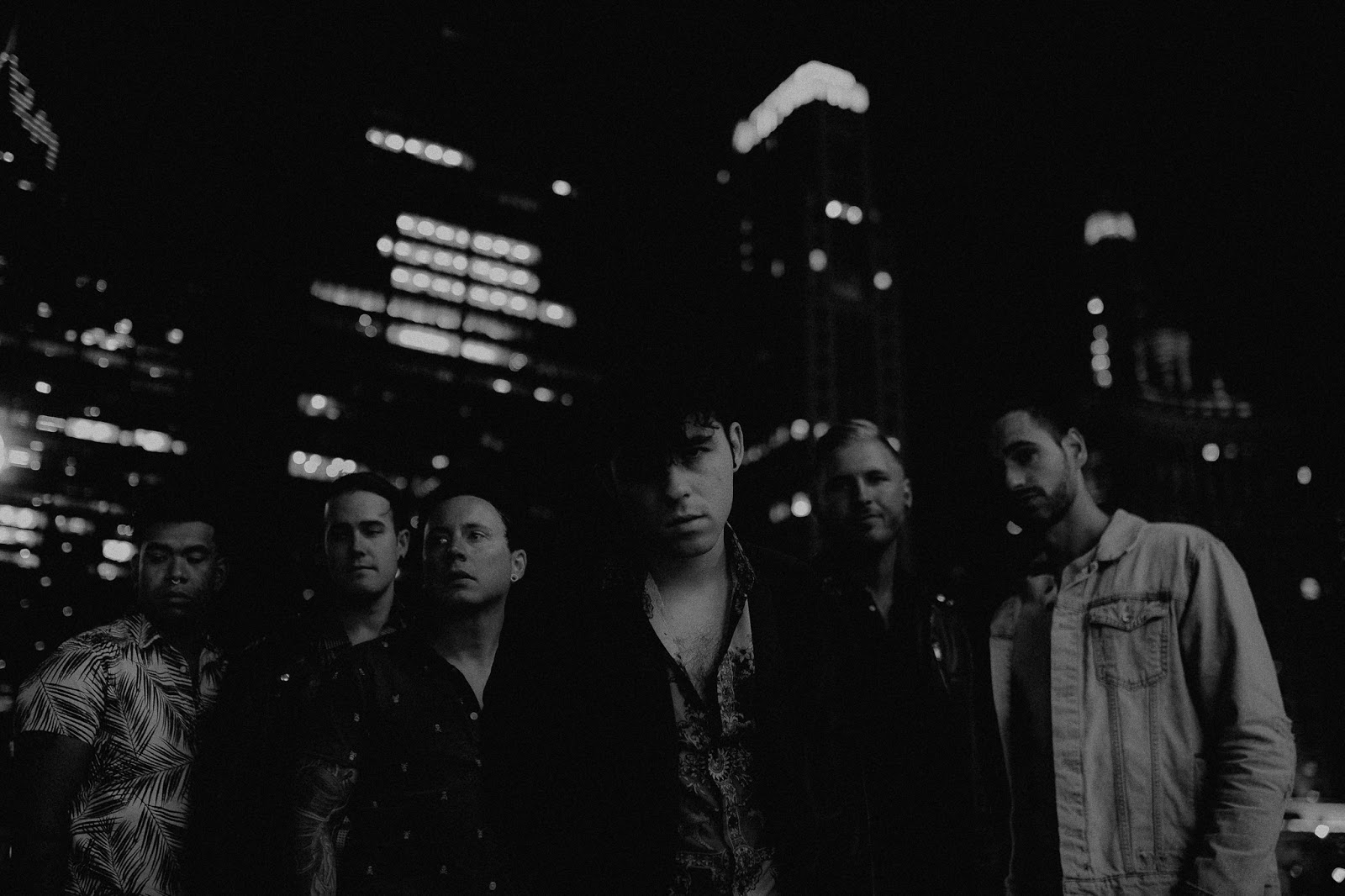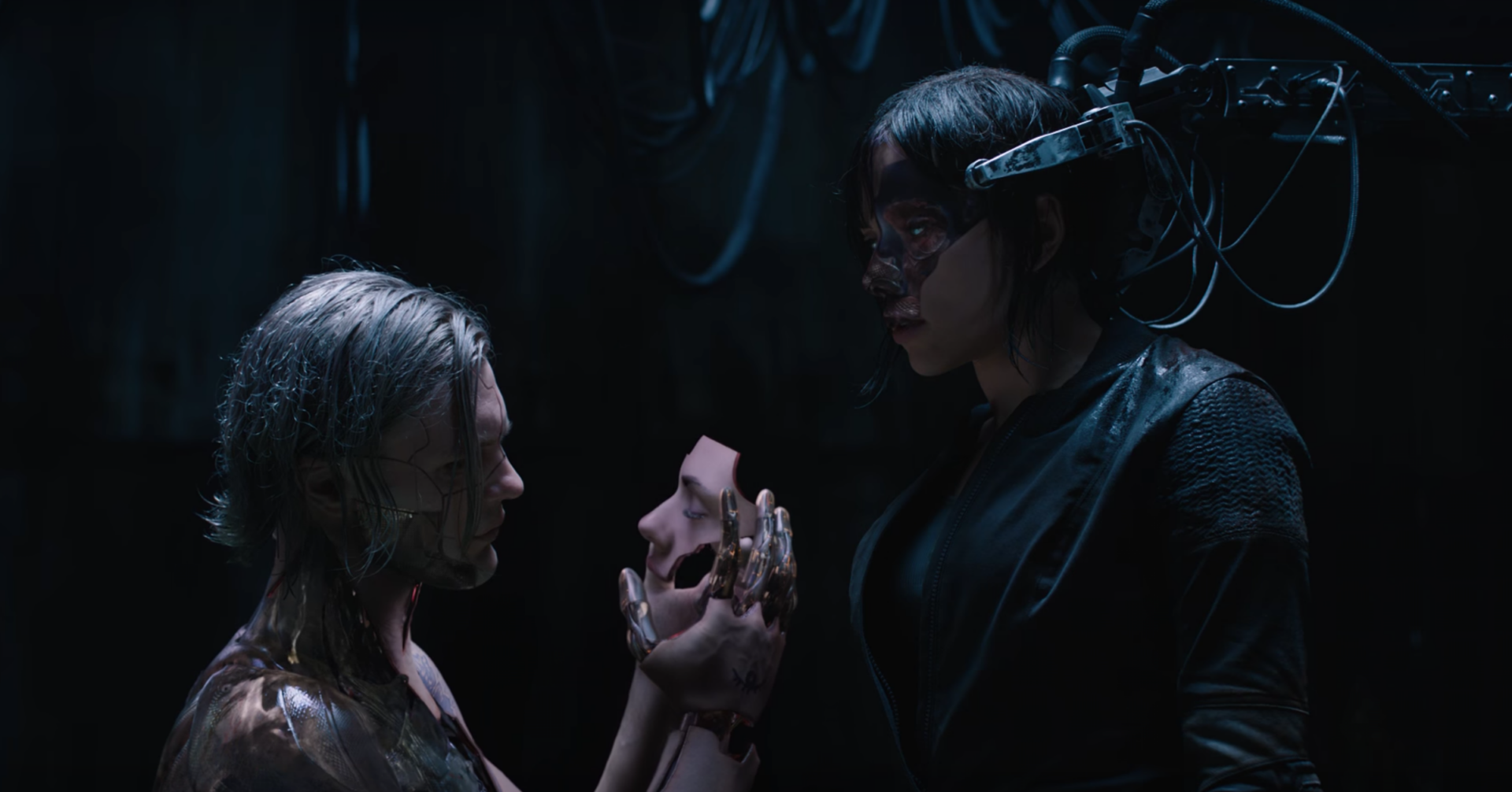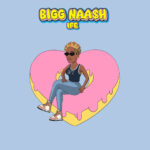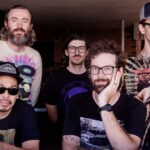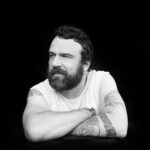Playing two sets a night – with only a fifteen-minute changeover in between – sounds exhausting, but Ilan Rubin is a pro. On this run, he’s been doing double-duty as the lead vocalist and guitarist of The New Regime and the drummer of Angels & Airwaves, playing to sold-out crowds almost every night. Rubin has been sleeping “twelve or thirteen hours a night” to recuperate; before even hitting the stage, he’ll have soundchecks for both bands, sign posters, do a meet-and-greet, and do press.
The rooms on this tour are full, making for the biggest tour The New Regime has done (though they’ve played larger shows, opening for Muse in Mexico City and Scandinavia). Rubin is glad to see that Angels & Airwaves fans are “extremely receptive” to The New Regime’s music, and grateful Tom DeLonge and his other bandmates have given him the chance to play in both bands on this run. “It was the only way that I could kinda be in two places at once,” he tells Substream, explaining that eight months ago, he knew Delonge would want Angels & Airwaves to be touring around the same time The New Regime would be releasing new music.
Early in September, The New Regime released Heart as the first installment of the album Heart Mind Body & Soul. Each four-song installment – which Rubin clarifies are not individual EPs – will come out over a period of a few months. When it’s time for Soul, the individual releases will disappear from streaming services, to be replaced by the complete album, which will feature all sixteen songs “re-sequenced for optimal listening experience.”
Substream sat down with Rubin when the tour stopped in Philadelphia, after the meet-and-greet had finished for the day and before the show would begin, to dive in to Heart, the full album, and the tour.
SUBSTREAM: So you just put out Heart, which is the first installment of Heart Mind Body & Soul, but it’s been a couple years since your last New Regime release. Were you actively writing in that time?
Yeah, but what’s been difficult for me throughout the existence of The New Regime is the constant juggling of… A, my career as a drummer and all the various commitments that I have there, and B, me as The New Regime, writing music, which – writing is always the easy part in terms of scheduling, because I can do it wherever – if I have time at home, great, if I have time…
If you don’t have an interview today…
Exactly, and I always have an instrument around – I have plenty of tools to at least plant seeds that I can revisit later and turn into full songs. But touring has always been an issue. So – what happened was, as Nine Inch Nails finished the touring cycle in [2013 or 14, whatever it was]… Exhibit B came out in 2015.
Touring has always been tough, so once it came out… The New Regime toured for about a year and a half, pretty much for the first time doing a run like that. It was all stuff that we did ourselves and cobbled together; that takes you up to the end of [2016, 17 or whatever]. The thing is that when you do everything independently it definitely has its pros, but in my experience, it has plenty of cons.
What are the cons?
The cons are that you don’t have an infrastructure behind you while you are out on the “front lines.” For example, I’m out on tour for a year and a half – there are a lot of other things that can be done with an infrastructure, whether that be attempting radio or attempting press in certain ways in other markets, or – obviously with the advent of streaming, finding your ways into those formats – and then, it was a fairly new format, but all these other things that help support you while you’re out touring, which obviously they then start feeding off of each other – it’s been a really difficult thing.
Right, and you could have something go viral on Spotify or YouTube, and maybe that would lead to a tour, but you’re not able to push that if the captain of the ship is also swimming.
Exactly, and it’s funny because it couldn’t be more opposite when you come off of a great Nine Inch Nails run and then you do a New Regime run where it’s three guys in a van, sharing a room – I mean, as bare bones as possible, but I love it! This tour, in particular, has been great, because we’ve been playing to full rooms…. We’ve also brought lights out this time; it’s our best version of a show yet.
I wanted to talk about Heart– do we call it an EP, do we call it part of an album?
Let’s call it both, and I will certainly elaborate, but ask me your question and I’ll take it from there.
Yeah, so I guess that was the question – you have Heart Mind Body & Soul – are they distinct? How is it all going to tie together eventually?
Well – I’m not saying this was done by design initially – but the idea is a theme [that] turned into other ideas that I’m very happy about…. What I mean by that is, before the album in general, I wrote a song called “Heart Mind Body & Soul.” It’s always a head-scratcher coming up with an album title that you think is cool, because what is an album title, what do they mean? So down the line, the idea came about as far as calling the album Heart Mind Body & Soul, and then what we thought about was, “okay, that’s cool – but we haven’t put out music in a little bit, this is the first release on a label” – ’cause everything was independent and all of this stuff is coming out through Sony Red.
With this being the first new release in a little bit, and people digesting music in more of a singles world or EPs, whatever you want to call it – I really don’t like EPs, I can get into that in a second- we thought, “what’s a good amount of music to come out with without just dropping a whole album in a day?” So, to me, one song – cheap, it’s not enough. Two songs – still kinda eh. Three songs – okay. Four seemed to be the number where it was a good amount that you could make a statement – ’cause you come out with one song, you can please a bunch of people, you can bum out a bunch of people. Everything I do evolves; for example if I were to just put out “A Way To Feel Again”, somebody could’ve been like “oh this is electronic, I don’t like this new New Regime”; it’s like, “hold on a second.”
Is each part going to be four songs?
Yeah. So Heart Mind Body & Soul as the album is going to be sixteen songs, and especially in this day and age it would’ve been ridiculous to say, “here’s my new album, it’s sixteen songs.”
The thing that’s a little interesting is that… when I come up with the track-listing for each of the EPs, it’s for whatever will be Heart Mind Body & Soul – meaning that when the album is out in its entirety, these EPs will disappear, and you’ll be left with an album called Heart Mind Body & Soul, and it will all be re-sequenced for optimal listening experience, ’cause these are more designed like – here’s four songs, hit you in the face with it, and in two months, I’ll hit you in the face with four others.
Where are you in the writing and recording and production process for all of this? Is everything done?
Done. All done.
Are you like…
I’m very impatient. I want everyone to hear it immediately. I’m very proud of it – I think it’s the best that I’ve done yet. And – going back a little bit, to talking about EPs… the reason why I don’t like EPs, or the term EP, is for whatever reason it sounds like it’s of secondary importance: it’s not quite an album, it’s a little more than a single, but here’s music. That’s the way “EP” sounds to me and I hate that, which is why Exhibit A and B, was not quite an album…
It was like two parts of an album?
Well, I packaged them together just ’cause they went together nicely, but let’s say I had another chunk of six to eight songs, that – like this isn’t an album but this is a statement in and of itself – call it Exhibit C and then I have this sort of… anthology of things that lie somewhere between what an EP would be and what an album is, so I called them Exhibits. That being said with this – yes, I’m releasing them in EPs but as I said, when they’re all out, and it’s Heart Mind Body & Soul –
I’m not going to be able to go on Spotify and find them separately?
You’re not gonna find Heart, no.
You can go either as physical in terms of the production, or as deep and emotional as you want, – but what is “heart” to you – how did you conceptualize “heart” here?
What I’m gonna say kinda goes for all of the parts. With whatever you’re talking about, whether it be mind, body, soul, heart, you can very easily see two distinct opposing emotions or feelings. So, if you have “heart”, it could mean you’re really putting your heart in to something and it’s positive – or your heart’s broken, that’s negative. I’m not saying that’s what it’s about, but there were sort of inadvertent themes, lyrically, that I was then able to go, “Okay, I’ll put in these things that are heart, what makes sense?” – and it all lined up beautifully, subconsciously or coincidentally, I don’t know why or what.
You have songs like… “A Way To Feel Again”, alright, “Feel No Pain”, obviously these are feelings, so we equate that to the heart, but then I have other songs, for example, on Body, where very literally – there’s a song called “Struggle In My Bones”, and that very literally has a body connotation. The point of what I’m saying is… there are different ways of kind of viewing the same thing, so Mind – a song off that would be “It’s Gonna Be Okay”, and it’s one of the rare positive jams that I offer lyrically, but then you also have “Sweet Kind Of Suffering” and these are –
Oh! That sounds like not a positive song.
Exactly! But they both make sense and live together on what will be Mind, so – I know I just went around in circles, but just so you can see the way I thought about what I put together in each group of songs.
It sounds like it was something that was really conceptualized as a whole, versus like “Oh, maybe I’ll do this, and this, and see how it fits together.” I heard an interview with Bazzi recently and he went in to this whole thing where he wanted to call his release a mixtape, not an album, because to him, the word “mixtape” symbolized more of a cohesive thing versus an album. I’ve always felt like “album” was the cohesive project and “mixtape” is more “okay, here’s a bunch of songs.” And I feel like – what you’re doing is what I consider “an album.”
Yeah. It’s very weird – and interesting, I should say – how everybody can have their own opinion or perception, more accurately, as to what something could be. So – yeah, you and I would look at albums the same way, and that could we whether something is conceptually driven from the onset, or whether it’s – this is a snapshot of where I am and these are the songs I’ve written right now, and I’m pretty much right in between those two things. I haven’t done anything that’s a “concept album”, per se, ’cause I feel like those are usually – “this is the story I’m trying to tell” or “this is what I’m trying to convey”, and you have the intent behind every single lyric that ties everything together.
I’m not making a comparison by any means, but I always love the way Jimmy Page described albums, where he said “this is a snapshot of where we are right now. So you can listen to the fourth album and that’s where we were in 1971 – done, move on.” And I like that, because it’s not necessarily conceptually driven, it’s just evolutionary.
Right, it’s like, “here’s where I am.” To me, I always have so many things going on in my mind and my life – how could you pick one thing to write about?
It’s difficult because not only that, but with the way music works, I guess the way anything works, really, if you are in an industry where you create something and somebody else, for lack of a better word, is trying to sell it, okay – they want to try to pinpoint whatever that one thing may be. And usually people are wrong.
What do you mean?
I’d say the biggest singles in long times – or the biggest bands in a while – are ones who were either turned down multiple times, or… they picked one single but it was this other one that somebody started playing and then it grew, and – that sort of thing – that happens.
JK Rowling got rejected by a million publishers.
That woman is an inspiration. I’m serious! But that’s a great example. But there’s so many bands, and then you have people on the business side trying to whittle it down and reduce it to a science, and it’s never gonna be that way.
Going back to the tour, you were saying that the Angels fans were digging your stuff; have most of them known The New Regime’s music?
It’s been such a mixed bag, which is great.
There’s the very rare occurrence where – for example a kid came up to me in Charlotte and was like, “I’d never heard of Angels & Airwaves, but I was so excited to see The New Regime tonight, and I liked your other set.” Don’t get me wrong, it’s a rarity, but that means a lot to me. The other night, my friend and I here were having dinner and we were eating outside, and some guy came off the street and said “Hey man, I just want you to know – I love The New Regime.” I’m like “cool, we’re playing tomorrow” – he’s like “what?” I’m like “yeah we’re supporting Angels & Airwaves” – “I had no idea!”.
On the record, you’re playing everything, but live, you have a band, correct?
I do, so live I play guitar and sing; for a few years, it’s been a three-piece band. I feel it gives a little more flexibility on…spreading your wings in terms of improvising a little bit or extending sections; [it’s] easier to do with three people as opposed to four – the band will eventually go back to being a four-piece. I also play piano depending on what the setlist is, but not on this tour, just guitar.
When you’re getting into rehearsals with your bandmates , do they play straight off the record, or do they take some freedom?
No, they learn straight off the album – I basically make mixes for everybody. For example, Rob playing drums, I made him a mix that is just his drum tracks and his harmony tracks – ’cause everyone in the band sings ’cause harmony is a big part of the music. And then for example, Campbell just joined us on this tour on bass, and I made him a mix that was bass and drums and his vocals. Now the thing is, is that melodically, rhythmically, I want everything to be as it is – so this is the bass line, these are the chords, these are the harmonies. Surprisingly, or some people have found surprising, is that I’m not a stickler for the drummer.
That’s something I was curious about.
The beats have to be the same, but in terms of fills, I don’t care. I just want the intent – within taste, of course – if somebody goes in there just showboating and it’s getting away from the song, that would piss me off – but fortunately, I haven’t experienced that in a long time. But drums are easy to have a lot of wiggle room, because they aren’t melodic, they’re not as distinctive as chords, harmony, melody. So as long as they don’t get in the way and they fulfill their purpose of driving or grooving or whatever it may be, I’m happy.
For more on The New Regime, including upcoming tour dates, head to www.TheNewRegime.com.


